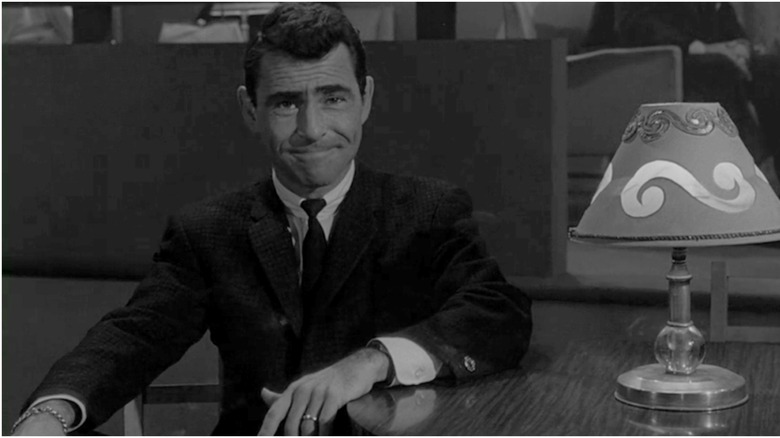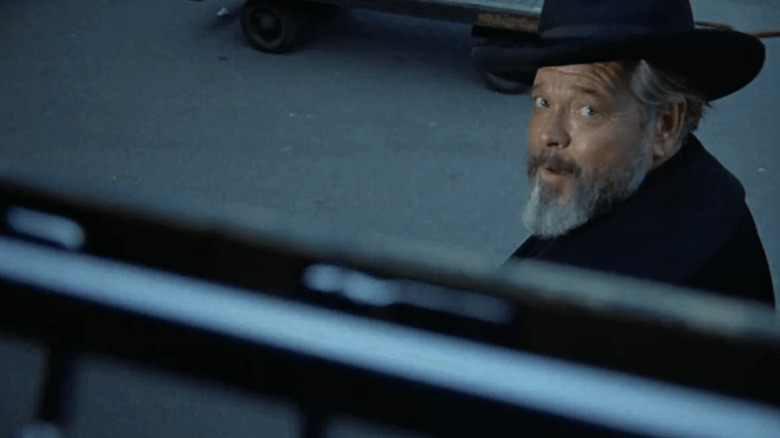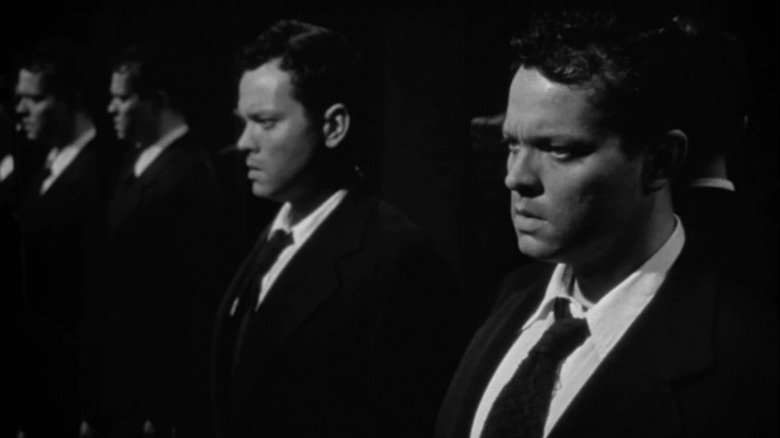The First Choice For The Twilight Zone's Narrator Was A Titan Of Hollywood History
Rod Serling was one of the first famous television writers. "The Twilight Zone" is foundational to its medium, and it was a predecessor for "Star Trek" in using science-fiction stories as allegories for issues facing mid-20th century America. The series' creator and head writer (he has credits on 92 out of 156 episodes), Serling was also the presenter of "The Twilight Zone." He narrated each episode, sometimes appearing in person but always opening the show and offering a summation of the story's theme at the end. In each closing, he was sure to drop the series' title in somewhere.
This role in front of the camera is the reason for Serling's fame; it made him the face of "The Twilight Zone," especially since as an anthology, the series had no regular stars. However, when the series was being developed, there was talk of bringing in an established actor to narrate the series: Orson Welles.
Alternate narrators
According to a 1989 Chicago Tribune piece titled "Rod Serling: Destroyed by Fame," Orson Welles had been the first pick to play the narrator of "The Twilight Zone." When "The Twilight Zone" premiered on CBS in 1959, the network had been running "Alfred Hitchcock Presents" for four years. It's plausible that the network's interest in Welles was rooted in them trying to replicate that series, another anthology show presented by a Hollywood legend. So why wasn't Welles chosen? Simple: Casting him would've been too expensive.
Welles wasn't the only narrator considered for "The Twilight Zone." The series' pilot, "Where Is Everybody?," originally featured an opening narration performed by Westbrook Van Voorhis. Van Voorhis was nowhere near Welles' caliber, but he had built a career as a professional narrator; he was especially well known for the "March of Time" newsreels, run from 1931 to 1945. Why was Van Voorhis replaced? According to behind-the-scenes content on a 1987 home media release of "The Twilight Zone," the producers thought he sounded too pompous.
With their first two choices having fallen through, Serling offered to narrate the series himself. Doing so saved the network the headache of further contract negotiations and gave "The Twilight Zone" just the narrator it needed.
Lost opportunities
Listening to Orson Welles speak, it's easy to see why CBS wanted him as the narrator for "The Twilight Zone." His Midwest baritone may be easily parodied, but its power is inimitable (unless you're Maurice LaMarche). Welles had begun his career in radio, where a powerful voice is a necessity. In the final film of his released in his lifetime, "F for Fake," he plays a role similar to the one Rod Serling does in "The Twilight Zone" — a sardonic, omniscient narrator. His last role, Unicron in "The Transformers: The Movie," was purely a voice role.
In another case of "what could have been" Hollywood history, George Lucas considered Welles for the voice of Darth Vader. In the end, though, he went with James Earl Jones because his voice was less recognizable; Lucas wanted audiences to hear Darth Vader, not Orson Welles, when the character spoke.
Just like Jones was perfect for the Dark Lord of the Sith, Serling was the right pick to narrate "The Twilight Zone." His cool and laid-back but earnest delivery was perfect for the series' Kafkaesque humor. As magnificent a voice as Welles had, his performance likely would've drawn more attention to itself. This may have worked for the opening narrations, but it would've been quite out of place for the ending commiserations.
As for Westbrook Van Voorhis, you can be the judge, but when I listen to his narration I find myself agreeing with the CBS executives who vetoed his involvement. He does indeed sound pompous, and rather generic, too. Van Voorhis' narration can't hold a candle to Serling's sly delivery.


